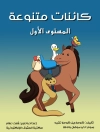The Jungle Book key characters are Mowgli, a boy raised by wolves and Sher Khan, biggest tiger in India. As Baloo the sleepy brown bear, Bagheera the cunning black panther, Kaa the python, and his other animal friends teach their beloved man-cub the ways of the jungle, Mowgli gains the strength and wisdom he needs for his frightful fight with Shere Khan, the tiger who robbed him of his human family. But there are also the tales of Rikki-tikki-tavi the mongoose and his great war against the vicious cobras Nag and Nagaina; of Toomai, who watches the elephants dance; and of Kotick the white seal, who swims in the Bering Sea.
Über den Autor
Joseph Rudyard Kipling (December 30, 1865 January 18, 1936) was an English author and poet, born in India, and best known today for his children’s books, including The Jungle Book (1894), The Second Jungle Book (1895), Just So Stories (1902), and Puck of Pook’s Hill (1906); his novel, Kim (1901); his poems, including Mandalay (1890), Gunga Din (1890), and ‚If‘ (1910); and his many short stories, including ‚The Man Who Would Be King‘ (1888) and the collections Life’s Handicap (1891), The Day’s Work (1898), and Plain Tales from the Hills (1888). He is regarded as a major ‚innovator in the art of the short story‘; his children’s books are enduring classics of children’s literature; and his best work speaks to a versatile and luminous narrative gift.Kipling was one of the most popular writers in English, in both prose and verse, in the late 19th and early 20th centuries. The author Henry James famously said of him: ‚Kipling strikes me personally as the most complete man of genius (as distinct from fine intelligence) that I have ever known.‘ In 1907, he was awarded the Nobel Prize in Literature, making him the first English language writer to receive the prize, and he remains today its youngest-ever recipient. Among other honours, he was sounded out for the British Poet Laureateship and on several occasions for a knighthood, all of which he rejected.However, later in life Kipling also came to be seen (in George Orwell’s words) as a ‚prophet of British imperialism.‘ Many saw prejudice and militarism in his works, and the resulting controversy about him continued for much of the 20th century. According to critic Douglas Kerr: ‚He is still an author who can inspire passionate disagreement and his place in literary and cultural history is far from settled. But as the age of the European empires recedes, he is recognized as an incomparable, if controversial, interpreter of how empire was experienced. That, and an increasing recognition of his extraordinary narrative gifts, make him a force to be reckoned with.‘












